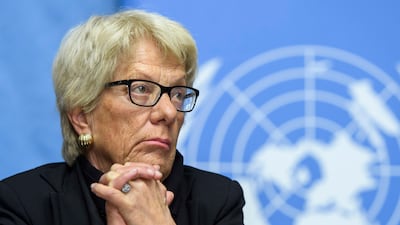Despair at Russia's role in blocking efforts to hold President Bashar Al Assad to account for Syria’s worst atrocities is widely felt but the decision by the UN’s most distinguished war crimes panelist to quit amounts to a wake-up call for action.
Not known as a place for airing diplomatic issues, Carla Del Ponte chose the unlikely setting of the Locarno Film Festival in her native Switzerland to make her final stand.
“I am quitting this commission, which is not backed by any political will,” she said. “I have no power as long as the Security Council does nothing,” she said. “We are powerless, there is no justice for Syria.”
She went on to decry all sides in the civil war. “Everyone in Syria is on the bad side. The Assad government has perpetrated horrible crimes against humanity and used chemical weapons. And the opposition is now made up of extremists and terrorists.”
Russia’s veto on the UN Security Council has doomed to failure attempts to bring Syrian and Iraqi war crimes to the International Criminal Court.
Ms Del Ponte, 70, made her name as the prosecutor who pushed for convictions of those facing war crime charges in Rwanda and former Yugoslavia. She is tough and principled, known to be uncompromising in the pursuit of justice.
Ms Del Ponte said the current situation was the worst she had experienced. “What we have seen here in Syria, I never saw that in Rwanda, or in former Yugoslavia, in the Balkans. It is really a big tragedy,” she added. “Unfortunately we have no tribunal.”
But the statements were nothing out of the ordinary when set against the findings of the panel that Ms Del Ponte has quit after five years.
Formally known as the Independent International Commission of Inquiry on the Syrian Arab Republic, the panel has produced a series of reports revealing the scale of abuse of civilians and the contempt for the laws of warfare in the conflict. A list of suspects is kept in a sealed envelope in a safe in Geneva.
The commissioners have chronicled chemical weapons attacks, sieges of opposition-held cities, aid convoy attacks and genocide against Yazidi population.
It has exposed the torture and killing by the Damascus government, warned that the “proxy war” was being manipulated by outside powers, threatened to identify the worst human rights abusers and said the US-led coalition was responsible for civilian deaths in bombing Raqqa.
Not everyone agreed that Ms Del Ponte’s announcement was a turning point.
Activists took issue with her depiction of the Syrian opposition, pointing out that many groupings had rebelled against the regime’s human rights abuses. “Del Ponte is correct on Assad but wrong on the last point - there are numerous people opposed to Assad who also support human rights for all,” said Kristyan Benedict, campaigns manager for Amnesty International. “It is impossible to be pro-Assad and pro-human rights for all, however, numerous human rights activists oppose Assad's rule - this is a fact.”
Last year amid fury at the security council’s inaction, the General Assembly overwhelmingly backed the creation of an office within the UN hierarchy to compile evidence of war crimes for prosecution in the future.
Nick Kaufman, a lawyer specialising in war crimes, questioned the role of the commission after the assembly ordered the UN to establish the new prosecutions office. “Her role was made pretty redundant anyway in light of the [UN prosecutors] mechanism surely?”
Ms Del Ponte’s commission is a body of the Human Rights council in Geneva. A spokesman for the commission said the remaining two members Brazil’s Paulo Pinheiro and Karen Koning AbuZayd, an American citizen, would continue their work.
“It is our obligation to persist in its work on behalf of the countless number of Syrian victims of the worst human rights violations and international crimes known to humanity,” it said.
Ms Del Ponte was the first prosecutor appointed to lead the UN war crimes tribunals in 1999. Her predecessors had been judges and she took a far more aggressive approach to the job.
After losing support of the US and Kofi Annan, then the UN secretary general, she was stripped of her role in the genocide trials in Rwanda. She had pushed for prosecution of the retaliatory atrocities committed by the Rwandan Patriotic Front (RPF) as well as the genocide itself.
She had also publicly vented her frustration with the tribunal on the former Yugoslavia.
Attended by favourable headlines - “Battling for Justice” and “The lady’s not a pushover” - Ms Del Ponte has never shied from giving her views. Before the establishment of the international criminal court, she repeatedly demanded the trial of Saddam Hussein and Osama bin Laden.


